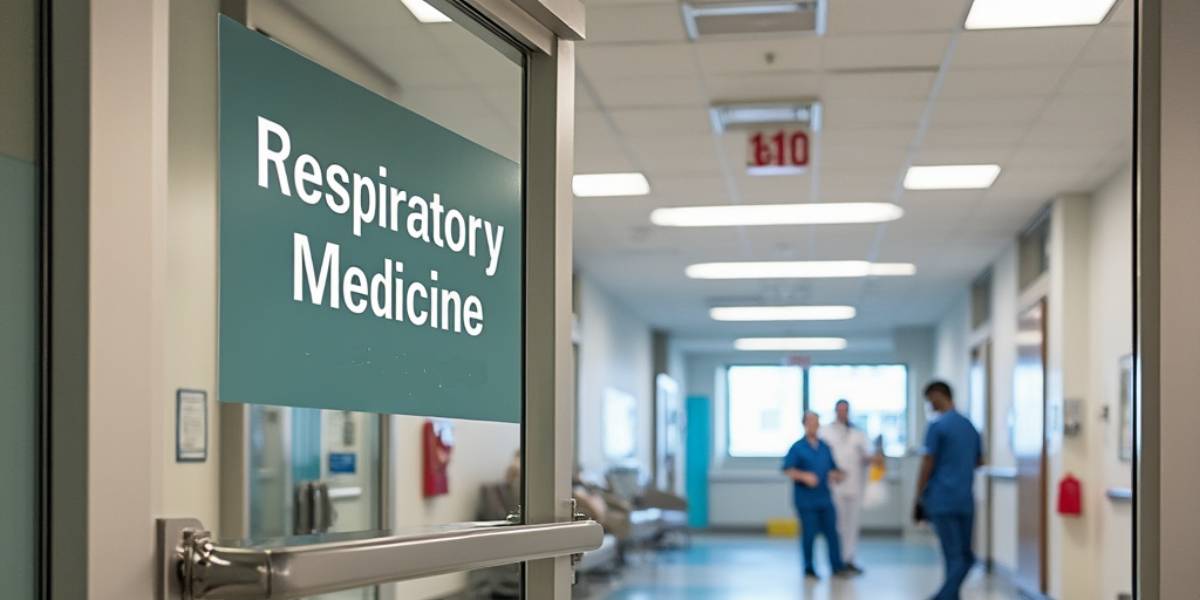Published Nov 24, 2024 | 8:24 PM ⚊ Updated Nov 24, 2024 | 10:54 PM

respiratory medicine
As India grapples with rising air pollution and holds the unfortunate distinction of being one of the most polluted countries, while simultaneously striving to achieve its promise of becoming tuberculosis-free, the health regulatory body appears to view these critical challenges through a different lens.
In August 2023, the National Medical Commission (NMC), the apex regulatory body for medical education in India, made a contentious decision to exclude ‘Respiratory Medicine’ from the list of mandatory departments for new medical colleges.
This move, formalised under the Guidelines for Undergraduate Courses under Establishment of New Medical Institutions, Starting of New Medical Courses, Increase of Seats for Existing Courses & Assessment and Rating Regulations, 2023 (UG-MSR 2023), has sparked widespread criticism from healthcare professionals, public health experts, and medical organisations.
The Indian Chest Society (ICS) and other stakeholders argue that the decision undermines the country’s capacity to tackle respiratory diseases—conditions already exacerbated by severe air pollution levels. They have warned that without dedicated training and infrastructure in respiratory medicine, India risks further compromising the health of its population.
The NMC has stated that the decision to remove respiratory medicine as a separate department was intended to reduce the academic burden on undergraduate medical students.
The Commission also claimed that respiratory medicine, along with the previously removed departments of Emergency Medicine and Physical Medicine and Rehabilitation, would now be integrated into broader disciplines like General Medicine.
However, this justification has been widely challenged. Critics contend that integrating such vital specialties into general medicine diminishes the depth and focus required to train future doctors effectively.
Dr. Arun Madan, Head of the Department of Respiratory Medicine at Hindu Rao Medical College in Delhi, expressed grave concerns, stating, “For decades, medical college hospitals have served as critical hubs for advanced respiratory care and training. By eliminating respiratory medicine departments, the NMC has jeopardised the quality of medical education and patient care across the country.”
India is currently facing an unprecedented air pollution crisis. Recent data indicates that Air Quality Index (AQI) levels in major cities, including Delhi, have crossed 1,000, far exceeding the World Health Organization’s (WHO) safe thresholds.
Poor air quality is linked to a dramatic rise in respiratory and cardiovascular diseases, particularly among vulnerable groups like children and the elderly.
Dr. Neel Thakkar, a Vadodara-based pulmonologist and member of the ICS, highlighted the gravity of the situation, noting, “India is witnessing alarming AQI levels. Cities like Delhi recorded their highest-ever AQI of 1,081, while Gujarat cities such as Ahmedabad and Vadodara reported ‘poor’ air quality. This surge in pollution has led to an increase in respiratory ailments like COPD, interstitial lung disease, and lung cancer, straining the healthcare system.”
The Delhi government, in response to the pollution crisis, has directed hospitals to set up dedicated teams to manage respiratory ailments. Hospitals have been tasked with monitoring and reporting daily outpatient (OPD) and inpatient (IPD) cases and flagging any unusual spikes in respiratory diseases. These measures underscore the urgent need for specialised respiratory care—a need that critics say will be unmet due to the NMC’s decision.
India bears the dubious distinction of having the highest global burden of tuberculosis (TB), including multidrug-resistant TB cases. Respiratory medicine departments have played a pivotal role in diagnosing, treating, and managing TB, as well as contributing to national elimination programs like the Pradhan Mantri TB Mukt Bharat Abhiyan.
Dr. Rakesh Chawla, Vice-President of the ICS and Head of the Department of Respiratory Medicine at Saroj Super Specialty Hospital, stressed the impact of the NMC’s decision on TB elimination efforts. “Respiratory medicine departments are central to achieving India’s TB elimination goals. Their removal from medical colleges undermines these efforts and risks increasing mortality and morbidity rates from a disease that we are already struggling to control,” he warned.
In response to the NMC’s decision, the ICS has initiated legal proceedings, filing a Public Interest Litigation (PIL) in the Bombay High Court. The ICS argues that the exclusion of respiratory medicine from the curriculum poses a significant threat to public health and is inconsistent with India’s stated goals for improving healthcare access and outcomes.
To raise awareness, the ICS has launched a nationwide campaign called “Save the Saviours,” which has garnered support from thousands of citizens and professionals. The campaign highlights the critical role of respiratory medicine in addressing the health impacts of pollution and respiratory diseases. Dr. G.C. Khilnani, Chairman of the ICS North Zone and former Head of Respiratory Medicine at AIIMS Delhi, stated, “Over 99% of India’s population is exposed to PM2.5 levels exceeding WHO safety guidelines. This dire situation demands urgent action, including reinstating respiratory medicine as a core subject in medical education.”
The decision to remove respiratory medicine is part of a broader shift in NMC policies, which many experts view as a setback for medical education and public health. Critics argue that these changes were implemented without adequate transparency or consultation with stakeholders, raising concerns about governance within the NMC.
Dr. Manoj Goel, Principal Director of Pulmonary Medicine at Fortis Medical Research Institute, emphasised the potential fallout. “Medical college hospitals, as tertiary care centres, are vital for managing cases of TB, COPD, and pollution-related illnesses. The absence of respiratory medicine departments creates significant gaps in both patient care and public health infrastructure,” he said.
Further, experts worry that the absence of specialised training in respiratory medicine will leave future generations of doctors ill-prepared to tackle India’s growing burden of respiratory diseases. Dr. Aditya Chawla, a consultant in respiratory medicine at Jaipur Golden Hospital, pointed out, “Comprehensive training in respiratory care is essential for managing the health impacts of air pollution. Aligning medical education policies with public health objectives is not optional—it is a necessity.”
To address the challenges posed by the NMC’s decision, healthcare professionals and public health experts have proposed a multi-pronged approach:
(Edited by Ananya Rao)

